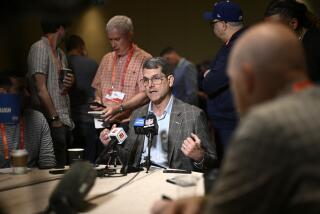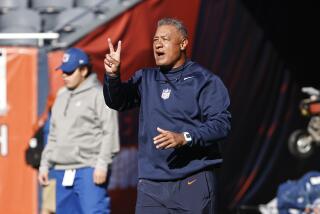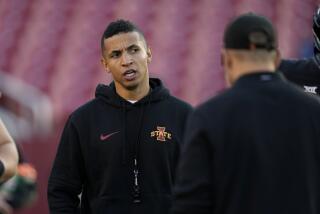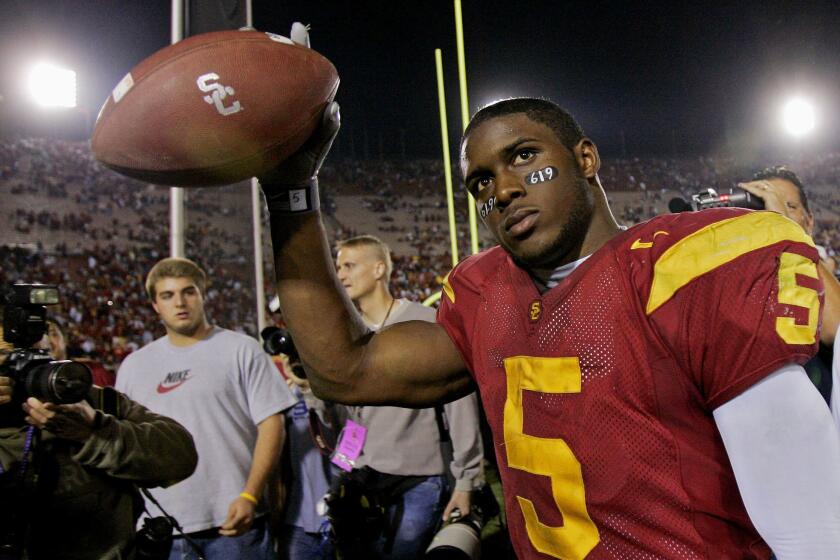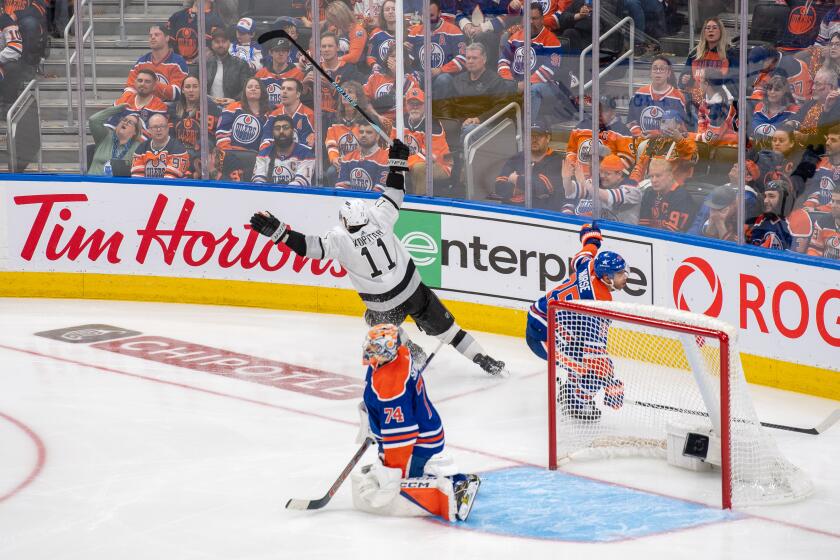Among the NFL’s eight new coaches, few will get a free pass at QB
PHOENIX — The NFL’s eight new head coaches have yet to conduct a practice, or even solidify their rosters, but already they can be roughly divided into three groups.
The haves, the might-haves and the have-nots.
That’s those who have an answer at quarterback, those who might, and those who clearly don’t.
“It’s like a writer without a pen; there’s a problem,” Kansas City’s Andy Reid said at the league’s annual owners meetings last week. “You’ve got to make sure that you’ve got that position taken care of.”
Reid feels good about his situation, having traded for San Francisco’s Alex Smith.
Marc Trestman, Chicago’s new coach, has an unquestioned starter in Jay Cutler.
“Jay is as good with his ability to throw the football as I’ve coached,” Trestman said.
But those lucky coaches are in the minority. New hires Chip Kelly in Philadelphia and Mike McCoy in San Diego might have their answers in Michael Vick and Philip Rivers, although both quarterbacks have been turnover-prone of late. It’s too early to tell if Cleveland’s Rob Chudzinski is in good shape with second-year quarterback Brandon Weeden.
Then there are those new coaches still on the lookout: Jacksonville’s Gus Bradley, Arizona’s Bruce Arians and Buffalo’s Doug Marrone.
“We’re going to have somebody back there playing that position for us,” Marrone said when asked about the Bills’ quest for a franchise quarterback, something they haven’t had since the Jim Kelly days. “I don’t know what tag we’re going to put on him. But I’m excited to work with the players we have there now.”
Arians goes from coaching Ben Roethlisberger in Pittsburgh and Andrew Luck in Indianapolis, to a Cardinals franchise that has been groping for answers since Kurt Warner retired after the 2009 season.
“We need leadership on that side of the football, and in our whole locker room,” Arians said.
This isn’t considered a strong quarterback draft. However, Bradley — formerly Seattle’s defensive coordinator — got an up-close view last season of how a young quarterback can unexpectedly rise and establish himself as the solution.
The Seahawks selected Russell Wilson in the third round, and the 5-foot-11 Wisconsin standout not only won the starting quarterback job over prized free agent Matt Flynn, but also became a candidate for offensive rookie of the year.
“They spent a lot of money to sign Matt Flynn, and then they chose a third-round quarterback,” Bradley said. “And [Coach Pete Carroll] says, ‘We’re going to go with Russell.’ You need the backing of ownership, and the wisdom that you’ve gone through it, and say, ‘I have such conviction, I’m going to do it.’”
The Jaguars, who two years ago took Blaine Gabbert with the 10th pick of the draft, might use the No. 2 overall pick on a quarterback, West Virginia’s Geno Smith. They spent a considerable amount of time with him at his recent pro day.
“I sat down one on one with him, and I just wanted to see how he would be once he entered our building,” Bradley said. “Are people going to gravitate toward him? Is he going to be a leader? Is he going to be a guy that everybody backs, and will he allow that to happen?
“I wanted to see his competitiveness. . . . We had a great talk. I was very impressed with him. I had high expectations, but I think I came out of there feeling even better.”
Perhaps most intriguing is the situation in Philadelphia, where the Eagles are hoping Chip Kelly can bring the phenomenal success he had at Oregon. His teams ran a fast-paced, read-option offense that usually overwhelmed opponents.
But Kelly takes issue with those who see him as an outside-the-box outlier who will try to force his template into the pro game, rather than adjusting to what his players do best.
“I don’t think anybody’s inventing anything new,” Kelly said. “It’s a very cyclical game. A lot of things that are being done with the Wildcat formation was the single-wing formation run way back when. Dick Kazmaier won the Heisman Trophy at Princeton running the single-wing offense. He would have been a good zone-read quarterback.”
What’s more, Kelly doesn’t expect NFL coaches to be caught flat-footed by whatever wrinkles he does fold into his scheme.
“We don’t run some magical offense or defense,” he said. “You’re talking about the best coaches in the world at this level. They see everything that we’ve done at the college level, and everything we’ll do, they’ve seen before.”
Kelly said he’s talked to quarterback Nick Foles on the phone to check in on him, and he’s seen Vick around the facility, but the collective bargaining agreement precludes coaches from even talking football with players at this time of year.
The coach said it’s his job to adapt the offense to whichever quarterback wins the job.
“If you’ve got a good coaching staff, that’s what you do,” he said. “The best example in the NFL is [Denver Coach] John Fox. A year ago, he had Tim Tebow and went to the playoffs. Now, he has Peyton Manning and runs an entirely different offense, and went to the playoffs. When you’re good, you adapt to who you have.”
The way Kelly sees it, that means zeroing in on one quarterback rather than simultaneously bringing along two who might have different skill sets, such as Vick and the less mobile Foles.
“I’ve never been a two-quarterback guy,” Kelly said. “When we were at Oregon, it was always distinct that one guy was the guy. He separated himself. “
Kelly has never coached in the NFL before, although he has had opportunities, including when Tom Coughlin tried to add him to his New York Giants staff in 2006.
In the AFC, each division has one coach who has never been an NFL head coach. That’s the Browns’ Chudzinski in the North, the Jaguars’ Bradley in the South, the Bills’ Marrone in the East and the Chargers’ McCoy in the West.
Although he has never been a permanent head coach in the NFL, Arians was named the league’s coach of the year last season after leading the left-for-dead Colts to the playoffs as an interim.
Asked how quickly he’d like a starter to emerge in Arizona, Arians had a simple answer:
“Tomorrow.”
twitter.com/LATimesfarmer
More to Read
Get our high school sports newsletter
Prep Rally is devoted to the SoCal high school sports experience, bringing you scores, stories and a behind-the-scenes look at what makes prep sports so popular.
You may occasionally receive promotional content from the Los Angeles Times.
